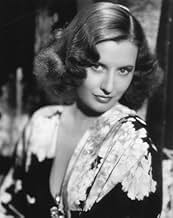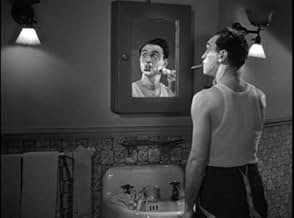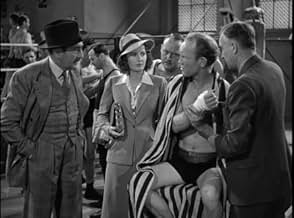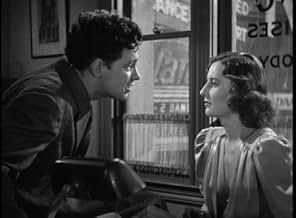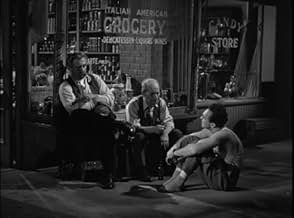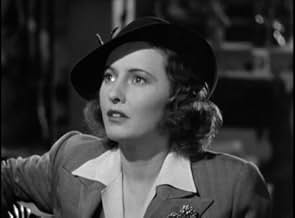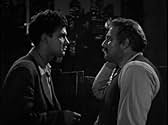IMDb रेटिंग
6.8/10
2.3 हज़ार
आपकी रेटिंग
अपनी भाषा में प्लॉट जोड़ेंA poor young Italian man, who is a virtuoso on the violin, wishes to become a champion boxer to make a fortune for his family. But what is the road to success and happiness, and what is the ... सभी पढ़ेंA poor young Italian man, who is a virtuoso on the violin, wishes to become a champion boxer to make a fortune for his family. But what is the road to success and happiness, and what is the price?A poor young Italian man, who is a virtuoso on the violin, wishes to become a champion boxer to make a fortune for his family. But what is the road to success and happiness, and what is the price?
- 1 ऑस्कर के लिए नामांकित
- 1 जीत और कुल 1 नामांकन
Edward Brophy
- Roxy Lewis
- (as Edward S. Brophy)
Charles Halton
- Newspaperman
- (काटे गए सीन)
Stanley Andrews
- Driscoll - Fight Official
- (बिना क्रेडिट के)
Gordon Armitage
- Fighter
- (बिना क्रेडिट के)
Earl Askam
- Policeman
- (बिना क्रेडिट के)
Don Brodie
- Reporter
- (बिना क्रेडिट के)
Mushy Callahan
- Fight fan
- (बिना क्रेडिट के)
Dora Clement
- Ill Ringsider Who Won't Leave
- (बिना क्रेडिट के)
फ़ीचर्ड समीक्षाएं
While 1939 has been properly established as a year of many exceptional films of the American cinema, my favorite actor, Miss Barbara Stanwyck, starred in two: The DeMille epic UNION PACIFIC, and this Clifford Odets' play-turned-movie, GOLDEN BOY. While this film is usually recognized as the one that made William Holden a star, equally famous is the story of how he would have been fired from the film during production had it not been for veteran Stanwyck sticking up for him, insisting that they give him a chance, and then helping him to be a success. There were no shortages of established leading men waiting in the wings for this coveted role, so Barbara's unselfish act forged a life-long relationship between them for which Holden thanked her with a gift of roses each year on the anniversary of the film's opening. In one review, Richard Corliss writes, "...Stanwyck godmothered the young William Holden to stardom and earned his lifelong devotion." I'm sure this real life teacher/student relationship is also mirrored in the actual drama that unfolds on the screen. In spite of their difference in age, however, it's not as vast as the Holden/Swanson relationship in SUNSET BOULEVARD, and the chemistry on Golden Boy is more evenly matched and more appealing. Furthermore, the supporting cast of Aldophe Menjou, as the boxing manager, Lee J. Cobb as Holden's dad, and Sam Levene as Holden's brother-in-law is so tightly woven that the movie has all the charm and intensity of the Broadway play on which it is based. A memorable line that Stanwyck delivers when she is luring the golden violin prodigy from practicing his scales to make some extra dough on the side as a prizefighter is, "...you take a chance the day you are born, so why stop now?" When he doesn't at first take the bait, watch out for the dated line, "I'll see you in 1966 when, by then, you may have become somebody..." Of course, thanks to Barbara, it happened in 1939. This is an extremely satisfying film suitable for the whole family.
"They are good for only one thing now - slugging!", Joe Bonaparte says with self-disgust, looking down at his broken hands after a middleweight prize fight at Madison Sqare Garden.
Joe had the option to be a great classical violinist, but the girl he was in love with wet his appetite for the quick buck and the American dream. "It's a big city, little people don't stand a chance", says Lorna, egging him up, playing up to his male ego. "Money's the answer". And the poor Italian immigrant kid grabs the bait, hangs up the violin and sells out.
'Golden Boy' is a piece of vintage Americana that is a bit hard to take today. Clifford Odets' controversial play was openly socialist and crammed with sudden, badly integrated political insights about "competetive civilization" and "a man hits his wife, and it's the first step towards fascism". It is all about the flip side of the American dream and gets a bit heavy-handed at times.
Lee J. Cobb is almost unbearably schmaltzy as the all-embracing, tearful Italian Papa, whereas Adolphe Menjou balances his performance carefully as the basically benign boxing promoter whose mistress is Lorna, Joe's chosen one, "just a dame from Newark" as she presents herself.
Barbara Stanwyck is more or less going through the motions as the hard-as-nails Lorna, and the real star of the picture is 21 year old newcomer William Holden, impossibly handsome and hunky, starting out with perfectly tousled curly hair. His performance is as yet immature and unfinished, but he has his moments and makes up for a shaky ride with loads of charisma, and he more than holds his own in the climactic title fight at the Garden, playing against the Chocolate Drop, "the pride of Harlem" in this race-segregated boxing haven.
'Golden Boy' is not, though, one of director Mamoulian's happier efforts. It is far too maudlin to look like anything Mamoulian ever did, it is not like him to lay it on this thick. It has none of the quirks or edge from 'Dr. Jekyll and Mr. Hyde' among others, but it is lushly, richly orchestrated in the vein of 19th century European music.
Joe had the option to be a great classical violinist, but the girl he was in love with wet his appetite for the quick buck and the American dream. "It's a big city, little people don't stand a chance", says Lorna, egging him up, playing up to his male ego. "Money's the answer". And the poor Italian immigrant kid grabs the bait, hangs up the violin and sells out.
'Golden Boy' is a piece of vintage Americana that is a bit hard to take today. Clifford Odets' controversial play was openly socialist and crammed with sudden, badly integrated political insights about "competetive civilization" and "a man hits his wife, and it's the first step towards fascism". It is all about the flip side of the American dream and gets a bit heavy-handed at times.
Lee J. Cobb is almost unbearably schmaltzy as the all-embracing, tearful Italian Papa, whereas Adolphe Menjou balances his performance carefully as the basically benign boxing promoter whose mistress is Lorna, Joe's chosen one, "just a dame from Newark" as she presents herself.
Barbara Stanwyck is more or less going through the motions as the hard-as-nails Lorna, and the real star of the picture is 21 year old newcomer William Holden, impossibly handsome and hunky, starting out with perfectly tousled curly hair. His performance is as yet immature and unfinished, but he has his moments and makes up for a shaky ride with loads of charisma, and he more than holds his own in the climactic title fight at the Garden, playing against the Chocolate Drop, "the pride of Harlem" in this race-segregated boxing haven.
'Golden Boy' is not, though, one of director Mamoulian's happier efforts. It is far too maudlin to look like anything Mamoulian ever did, it is not like him to lay it on this thick. It has none of the quirks or edge from 'Dr. Jekyll and Mr. Hyde' among others, but it is lushly, richly orchestrated in the vein of 19th century European music.
This is a wonderful, compelling, emotionally charged movie, with characters that are both interesting and likable. Of course, the central character of the movie is Joe Bonaparte, played by a young, gifted actor named William Holden. Joe's conflict, between his quest for fame as a prize fighter and his father's wish to become a concert violinist, although seemingly corny and contrived, actually works in this movie. And this can be attributed to the fine acting of all the players - Barbara Stanwyck, Lee J. Cobb, Adolph Menjou, and William Holden - who prove that high quality acting can transform a good script into a great script. One particularly intense scene is when Joe tries to play the violin - and he can't, leaving him devastated in the knowledge that he had squandered a gift and in the process had disappointed his father. This is a movie that is worth the time to watch and to enjoy.
William Holden became a star as a result of this film, but there is no question that Barbara Stanwyck is the real star of this picture. She gives a performance that is beautifully layered and Her performance is nothing short of marvelous (My favorite line is when she says, "I'm my mother's girl"). And those beautiful shoulders!
Everyone knows the story of the boy who is torn between a life of boxing and music. The screenplay is a product of the times that it was written in. How else can you explain dialogue that glorifies men beating their wives? Or the leftist remarks that are spoken by the Bonaparte's friend, Mr. Carp? A black boxer named "Chocolate"?! Never happen today.
Everyone is great. Lee J. Cobb as an Italian is heartbreaking, even if his accent is laid on a little thick (It's like watching Laurence Olivier in "The Jazz Singer"). Sam Levene is good as the brother-in-law. And Joseph Calleia as Fuseli, is wonderful. When Stanwyck enters Holden's dressing room after the fight, he says, "Out Miss Moon, this ain't no cocktail lounge." Wonderful. I would love to see Pacino ham his way through this role.
But it is Miss Stanwyck who stands out. We can be thankful that she gave Holden his opportunity and fought to keep him. We can be even more grateful for this wonderful performance.
Everyone knows the story of the boy who is torn between a life of boxing and music. The screenplay is a product of the times that it was written in. How else can you explain dialogue that glorifies men beating their wives? Or the leftist remarks that are spoken by the Bonaparte's friend, Mr. Carp? A black boxer named "Chocolate"?! Never happen today.
Everyone is great. Lee J. Cobb as an Italian is heartbreaking, even if his accent is laid on a little thick (It's like watching Laurence Olivier in "The Jazz Singer"). Sam Levene is good as the brother-in-law. And Joseph Calleia as Fuseli, is wonderful. When Stanwyck enters Holden's dressing room after the fight, he says, "Out Miss Moon, this ain't no cocktail lounge." Wonderful. I would love to see Pacino ham his way through this role.
But it is Miss Stanwyck who stands out. We can be thankful that she gave Holden his opportunity and fought to keep him. We can be even more grateful for this wonderful performance.
Notable for being William Holden's debut (he was just 21 and looks almost like a schoolboy!), this dated melodrama was adapted from a popular play by Clifford Odets dealing with a young man conflicted about which path to take in his life: a respected artistic career playing the violin and the more alluring celebrity (which also reaps instant monetary rewards) as a prizefighter. His Italian immigrant father (Lee J. Cobb, whose mannered performance has been especially criticized) obviously wants the boy to follow his musical instincts, but the pull of the ring is too great more so because through it he meets and falls for Barbara Stanwyck, actually his manager (Adolphe Menjou)'s fiancée. Though initially acting under the latter's instructions, she eventually tries to dissuade him from fighting, particularly when gangster Joseph Calleia (another fine showcase for the Maltese character actor) takes Holden under his wing. The climax sees the hero winning the championship bout but at the cost of his black opponent's life and his own left hand; with the help of Stanwyck (realizing she really loves the boxer, Menjou relinquishes her) the "Golden Boy" stands up to his new boss interestingly, Calleia lets him off rather too easily here when compared to similar films of later vintage! The film is pretty good (with equally solid support from Sam Levene as Holden's struggling cab driver brother-in-law) though betraying its stage origins by relegating the boxing matches to only a brief montage until the not very imaginatively handled finale; in hindsight, it's curious to find this cinematically lacking given the involvement of Mamoulian and his reputation as one of the most creative directors of the early Talkie era!
क्या आपको पता है
- ट्रिवियाWilliam Holden was so grateful to Barbara Stanwyck for her insistence on casting him in Golden Boy (1939), his first big role, that he reportedly sent her flowers every year on the anniversary of the first day of filming.
- गूफ़Joe's chest is completely smooth during the big fight. Immediately after the fight, when he is dressed, he has chest hair visible at the top of his shirt.
- भाव
Eddie Fuseli: This your girl?
Lorna Moon: I'm my mother's girl.
- इसके अलावा अन्य वर्जनA video version in Argentina was lifted from a 16mm print from Columbia Pictures, in English with Spanish language subtitles. The credits of this version are translated in Spanish.
- साउंडट्रैकWe're in the Money Now
Sung a cappella by Adolphe Menjou to the tune of the traditional
nursery rhyme "The Farmer in the Dell"
टॉप पसंद
रेटिंग देने के लिए साइन-इन करें और वैयक्तिकृत सुझावों के लिए वॉचलिस्ट करें
- How long is Golden Boy?Alexa द्वारा संचालित
विवरण
- रिलीज़ की तारीख़
- कंट्री ऑफ़ ओरिजिन
- भाषा
- इस रूप में भी जाना जाता है
- Zlatan decko
- फ़िल्माने की जगहें
- Eighth Avenue and 50th Street, मैनहटन, न्यूयॉर्क शहर, न्यूयॉर्क, संयुक्त राज्य अमेरिका(Madison Square Garden, located at the West side of 8th Avenue from 1925 to 1968)
- उत्पादन कंपनी
- IMDbPro पर और कंपनी क्रेडिट देखें
- चलने की अवधि1 घंटा 39 मिनट
- रंग
- पक्ष अनुपात
- 1.37 : 1
इस पेज में योगदान दें
किसी बदलाव का सुझाव दें या अनुपलब्ध कॉन्टेंट जोड़ें


